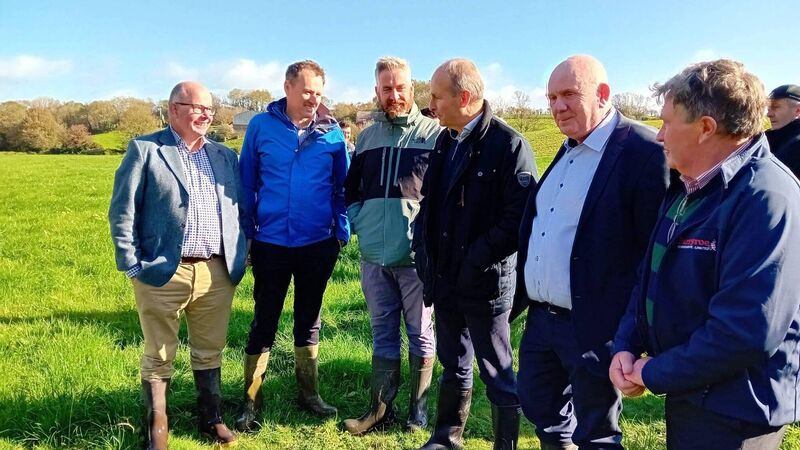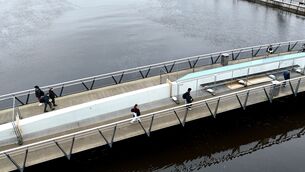West Cork farmers seek more time to prove effectiveness of measures to improve water quality

Cork TD Christopher O'Sullivan (third from left) with Minister for Agriculture Charlie McConalogue, (second from left) Tánaiste Micheál Martin (third from right) and Timoleague farmers.
Farmers in Timoleague, West Cork, are making a breakthrough with their research on the effect farming has on pollution, but it might be too late.
The Agricultural Catchments Programme (ACP) conducted by Teagasc has been recording water quality in six locations across Ireland, including Timoleague, for nearly 15 years.
The programme’s purpose is to assess the Nitrates Directive measures by studying the influence that agriculture has on water quality, with those participating in the Timoleague project attempting to prove that the amount of nitrates entering our waterways can be reduced without reducing cow numbers.
Cork South West TD Christopher O’Sullivan, who is also Fianna Fáil’s spokesman on Environment, Climate Action and Biodiversity, said that measures such as soil management and changes in slurry spreading practices are working to improve water quality.
Tánaiste Micheál Martin and Minister for Agriculture Charlie McConalogue visited Timoleague with Mr O’Sullivan recently to see the measures in action as the farmers call for more time to prove this.
It comes as Ireland’s current derogation is due to expire on 1 January 2026, and the derogation limit is due to reduce to 220 kg/ha on 1 January 2024 in certain areas, which will force farmers to cut the size of their herd, resulting in significant loss of income.
Christopher O’Sullivan explained to The Echo: “The nitrates directive was introduced in Europe because our waterways need to be cleaned up and one of the contributors is agriculture.
“Ireland has previously had a derogation allowing us a higher limit of nitrates because we are grass-based and have animals on pasture 10 months of the year.
“Europe said we need to see an improvement in your waterways, but the results were announced recently and there was no improvement in the waters that were tested.”
Minister McConalogue said last month that the EU Commissioner for the Environment, Mr. Virginijus Sinkevičius had confirmed that there was no prospect of re-opening the current Commission Decision conferring a derogation from standard Nitrates Directive rules on Ireland.
He said in a statement: “I made a strong case to Commissioner Sinkevicius for the retention of Ireland’s 250 kg/ha derogation until the next review, based on Ireland’s unique, grass based agricultural system, the measures farmers had already taken to improve water quality, and the need for additional time to see the results of these measures in our water quality indicators.
"The Commissioner made it clear that Ireland is one of only three remaining member states with a derogation, while stressing that there is no prospect of re-visiting the current decision.”
Deputy O’Sullivan explained that the research conducted by Teagasc has proved that by far the most effective way the dairy sector can reduce the amount of nitrates in our water is through targeted measures, as the science shows that reducing the amount of cows on their land has very little if any impact.
“There’s a naturally occurring nitrate in the ground, and the best way of stopping it going into water is ensuring that the crop takes up the nitrogen”, he said.
This includes not spreading slurry in the winter months as the crop isn’t growing as much and the nitrates aren’t taken up by the crops and they leak into the waterways.
They are also focusing on the mineral efficiency of the soil, as if the phosphorus and potassium are at the right level it optimises the amount of nitrates that the plant can take up, again leading to less of the nitrates ending up in the water supply.
“Farmers in West Cork have been through a really tough time”, the TD said, explaining: “I’m thinking of the smaller dairy farmer who maybe has 65 cows, they could have to reduce their herd to 50.
“This could make it unviable for them, and these are the most sustainable farmers - my worry is that we’re going to squeeze out a load of these smaller farmers.
“I was delighted that the Tánaiste and the Minister came down, because their methods in Timoleague are working.
“We need more time… instead of this blunt thing of removing the cows, we just need a bit of time to show we can do it.”
“Farmers know that they can’t just ignore water quality, they need to do their very best to improve it - it’s important we protect our farmers as well as focusing on cleaning up our waterways”, Mr O’Sullivan said.







 App?
App?


